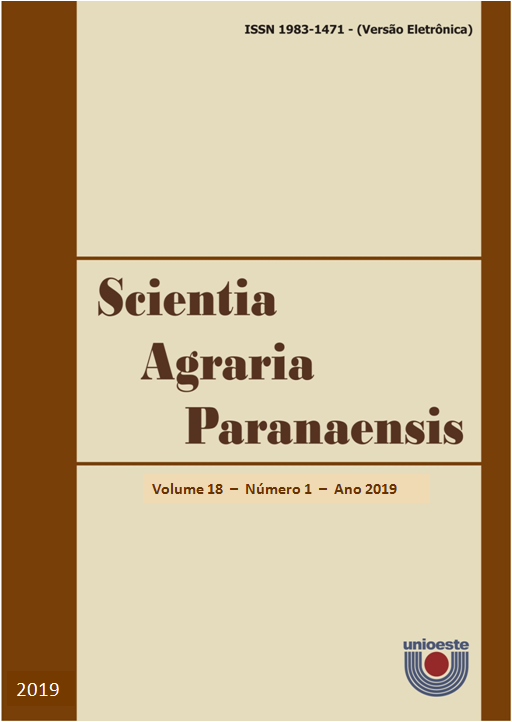Salicylic acid at beans germination against salt stress
Resumo
The common bean (Phaseolus vulgaris L.) is an important legume that is part of the daily food of the brazilians, being important for other countries. Because it is widely cultivated in almost all brasilian regions, is subject to environmental inclemencies, such as saline stress. Salicylic acid (S.A.) is an important plant hormone known to participate in pathways of systemic acquired resistance (SAR) against pathogens and also reported as a participant in the response to abiotic stresses. This study aimed to evaluate the action of salicylic acid prior to saline stress from three different concentrations of sodium chloride at the germination of a Brazilian common bean, cultivar Avaluna. The experiment was designed in randomized blocks, setting a 2x4 factorial scheme, with eight replicates of 25 seeds each. The following variables were evaluated: percentage of germination, root and shoot length, fresh root and shoot mass. The data were submitted to Tukey test with significance of 5%. The results indicated that there was statistically significant difference in the treatments in relation to the use of AS, that presented stable germination indexes for all evaluated treatments. This result was different from that observed in the treatments with water, where the increase of NaCl concentration resulted in a significant decrease in the percentage of germination. The results also indicated that, for the concentrations of NaCl and S.A. used in the cultivar Avaluna in this experiment, S.A. did not act as a protector against salt stress during the plant growth and development stage evaluated.
Downloads
Publicado
Como Citar
Edição
Seção
Licença
Aviso de Direito Autoral Creative Commons
Política para Periódicos de Acesso Livre
Autores que publicam nesta revista concordam com os seguintes termos:
1. Autores mantém os direitos autorais e concedem à revista o direito de primeira publicação, com o trabalho simultaneamente licenciado sob a Licença Creative Commons Attribution que permite o compartilhamento do trabalho com reconhecimento da autoria e publicação inicial nesta revista.2. Autores têm autorização para assumir contratos adicionais separadamente, para distribuição não-exclusiva da versão do trabalho publicada nesta revista (ex.: publicar em repositório institucional ou como capítulo de livro), com reconhecimento de autoria e publicação inicial nesta revista.
3. Autores têm permissão e são estimulados a publicar e distribuir seu trabalho online (ex.: em repositórios institucionais ou na sua página pessoal) a qualquer ponto antes ou durante o processo editorial, já que isso pode gerar alterações produtivas, bem como aumentar o impacto e a citação do trabalho publicado (Veja O Efeito do Acesso Livre).
Licença Creative Commons
Esta obra está licenciada com uma Licença Creative Commons Atribuição-NãoComercial-CompartilhaIgual 4.0 Internacional, o que permite compartilhar, copiar, distribuir, exibir, reproduzir, a totalidade ou partes desde que não tenha objetivo comercial e sejam citados os autores e a fonte.


